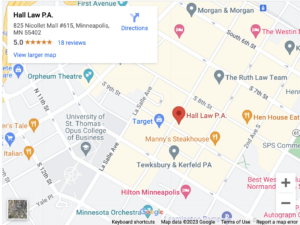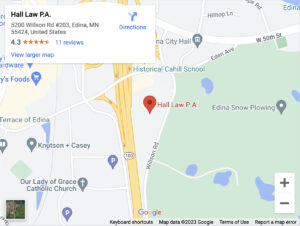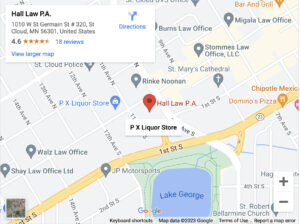
When someone causes an accident or injury, Minnesota personal injury laws hold the party responsible for resulting damages.
Damages in a personal injury case can include economic losses, such as lost wages and medical bills. Out-of-pocket expenses are a type of economic damage in personal injury claims.
What Are Out-of-Pocket Expenses in a Minnesota Personal Injury Case?

Economic damages are the financial losses you experience because of an accident, your injuries, and your recovery. Many of the expenses and bills you incur after a personal injury or accident are related to your medical treatment and loss of income. However, some costs may not fall into these categories.
Out-of-pocket expenses is a category used for financial losses related to your case that do not fall into other categories. Unfortunately, people often overlook these expenses because they pay them out of their pockets during the case. However, they can total thousands of dollars, especially if you have future damages for permanent impairment or disability.
Examples of out-of-pocket costs in a personal injury case include, but are not limited to:
Personal Care and Household Services
If you cannot perform household chores, take care of your kids, or need assistance with activities of daily living, you might need to hire help. The cost of hiring someone to help you dress, bathe, cook, and perform household chores can be included in economic damages.
Medications and Medical Equipment
Some expenses arising from your injuries are not directly related to the care or treatment provided by medical professionals. These expenses can be included in out-of-pocket costs.
Examples of expenses include:
- Over-the-counter medications
- Prescription drugs
- Crutches, wheelchairs, bedside toilets, walkers, and other medical equipment
- Medical supplies, including bandages, antiseptic wipes, etc.
Even though the expenses might be small when you incur them, they can add up during your recovery.
Transportation Costs
You can include the cost of going to and from medical appointments in out-of-pocket expenses. Other expenses that fall into this category include parking fees, public transportation costs, and rental car fees. If you must stay overnight away from home for medical treatment, the cost of the stay can also be included.
Modifications to Your Vehicle and Home
Sometimes, a personal injury results in a permanent disability or impairment. If so, you might need to modify your vehicle and home. For example, you might need to widen doors and install a ramp if your disability requires you to use a wheelchair for the rest of your life.
How to Hold the At-Fault Party Liable for Out-of-Pocket Expenses
You must prove that you incurred the expenses to include them in your settlement demand or request for a jury award. Therefore, you need proof that you paid the cost. Keep copies of all receipts, invoices, bills, and other evidence proving each expense.
Insurance companies attack out-of-pocket costs in two ways. First, the insurance adjuster might question whether the expense was necessary. For example, why did you need a wheelchair or neck brace after your accident?
Medical records and statements from your physicians can help prove why the expense was necessary. Your doctor’s diagnosis might not explain all costs. For catastrophic injuries or expensive out-of-pocket costs, we might consult a medical specialist to obtain a detailed explanation of why the cost was necessary.
The insurance company could also question whether the out-of-pocket cost was reasonable. For example, the insurance adjuster might question the price of a hospital bed for your home, claiming that you overpaid for it.
In that case, you might need evidence proving that the cost of the bed fell within the average price for beds of that quality. Furthermore, your doctor might need to explain why you needed that specific hospital bed model at home while you recovered.
Our legal team will work with you to track out-of-pocket expenses and document their cost. We can gather evidence from medical providers and other sources to prove that the expenses were reasonable and necessary.
Can Shared Fault Impact Payment of Out-of-Pocket Expenses?
Minnesota comparative fault laws reduce the amount of compensation you receive if you are partially at fault for causing your injury. For example, if you were 20% at fault for a car accident, a judge could reduce your jury award by 20 percent. Comparative fault applies to all types of compensatory damages, including economic damages.
Our lawyers understand this tactic, and we are prepared for the insurance company to try to shift the blame to you. We’ll aggressively defend against these allegations to protect your right to fair compensation for damages.
An Edina Personal Injury Lawyer Can Help You Identify and Calculate Out-of-Pocket Expenses and Other Damages
An experienced attorney will thoroughly analyze all damages in your case to maximize the amount of your recovery. We accept cases on a contingency fee basis, so you pay our attorneys’ fees after we recover a settlement or jury verdict in your case. Call Hall Law Personal Injury Attorneys today at (800) 292-1979 to schedule a free case evaluation with an experienced Edina personal injury attorney.



